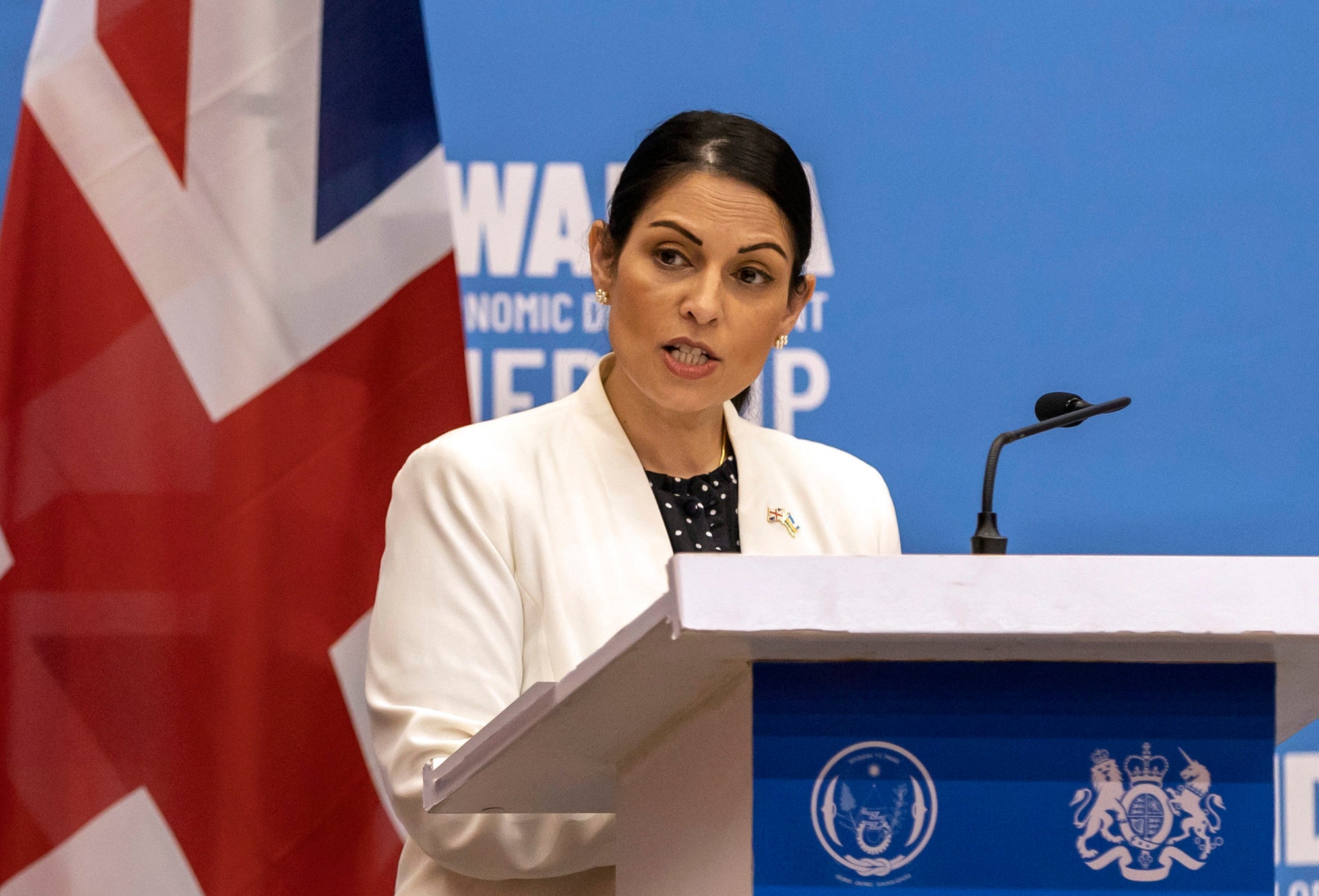
The government wants to send small boat migrants to Rwanda within just three weeks of their arrival in the UK, a court has heard.
Judges are considering the second judicial review of Priti Patel’s deal, which has not been implemented because of a wave of legal challenges by asylum seekers.
Launching their case at the High Court on Thursday, representatives of the Asylum Aid charity said the procedure for selected migrants was “inherently unlawful and unfair”.

“It is intended to be capable of completion ‘end-to-end’ – from start to removal – within two to three weeks,” said legal documents filed by the claimants.
Charlotte Kilroy KC, representing Asylum Aid, told the hearing that the process “appears to have been modelled on the evidently far more straightforward” procedure used to transfer asylum seekers between EU countries which was lost during Brexit.
“The timescale seems to be set based on how long it would take Rwanda to respond to referrals of individuals, rather than how long individuals needed to make their representations,” she said, arguing that asylum seekers do not have enough time to organise legal representation, gather evidence and make their case to the Home Office before being selected for removal.

Legal documents filed by representatives of the home secretary confirmed that the aim was to send small boat migrants to Rwanda within three weeks but denied the process was unlawful.
“There is no reason why the procedure should not be capable of completion fairly in two to three weeks,” the Home Office legal team said.
“That would further the objective of speedy decision-making in the public interest and individual interest.”
Lawyers for the home secretary said the fact the policy resembles the Dublin III agreement governing the transfer of asylum seekers between EU countries was “irrelevant”.
“The secretary of state, with the benefit of the specialist expertise of the Home Office, has implemented a public administration procedure appropriate to the issues for determination,” they added
“The procedure is, unsurprisingly, partly based upon similar decision-making frameworks which have operated successfully over many years and in respect of which the Home Office has developed substantial internal know-how.”

Home Office policy states the scheme can be used for asylum seekers who have arrived via “dangerous” routes – including small boat crossings – and are declared “inadmissible” for asylum by the UK because they passed through other safe countries where they could have claimed asylum.
Legal notices sent to people under consideration say: “If you feel that Rwanda is not safe for you personally, you must notify us immediately in writing or in person and explain why.”
Ms Kilroy said that it was an “error of law” for the home secretary to treat an internal assessment that Rwanda was a safe country as equivalent to the previous EU scheme or a 2004 law that contained a list of nations – not including Rwanda – considered safe for asylum transfers.
The Home Office legal team argued that in law, the home secretary is “empowered to effect removal to any safe third country following a determination of inadmissibility”.
In written arguments, Ms Kilroy said there were no proper safeguards in the procedure for selecting asylum seekers for the Rwanda scheme that are “aimed at ensuring fairness despite the speed”.
She added: “There is a very high risk that individuals who should not be processed under the procedure at all are not identified in time.”
The court heard that although Home Office policy is to not remove people with significant vulnerabilities or safeguarding concerns, there is no “effective” screening procedure to identify them.
Asylum Aid’s legal team said many people in immigration detention are not seen by a GP within 24 hours as required, and appointments that do take place can be carried out in five minutes, which is “insufficient for a full mental and physical examination designed to elicit evidence of vulnerability”.
Home Office representatives argued that specialist officers made decisions on sending asylum seekers to Rwanda in ways that are far and “procedurally efficient”.
They said the prompt determination of asylum claims was “in the public interest and a legitimate government policy objective”.
The challenge started as new figures showed that more than 75,000 migrants have arrived in the UK after crossing the Channel since current records began in 2018.
Almost 900 people arrived in small boats on Wednesday, with 2022 having already broken the annual record.
Ms Patel argued that the Rwanda deal, announced in April, would act as a “deterrent” to irregular crossings but numbers have continued to surge and recent opinion polling showed that most British people do not believe it will work.
High Court judges are due to rule on the Asylum Aid case and a previous legal challenge over decisions to send asylum seekers to Rwanda later this month.







